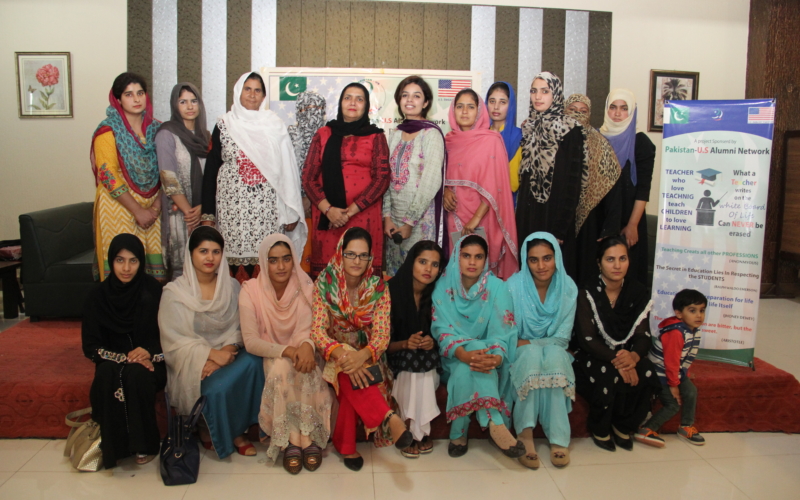TEA Alumna Conducts Teachers’ Training Program in Kamoke and Wahndo
Rubina Bashir teaches students of the 9th and 10th grade at a local public school in Kamoke, a small town in the Gujranwala District with a population of 167,300. With limited access to technology, educational institute have not absorbed the technological advances of smart boards and tablets.
Therefore, when she found out about the Teachers’ Training Program for Teaching Excellence and Reforms, she enrolled with hopes of learning about the latest pedagogical methods and technological integrations.
“We don’t have much infrastructure to innovate our methods of teaching with. But, this program has taught me how to innovate with the material at hand,” says Bashir.
Teachers’ Training Program for Teaching Excellence and Reforms, held from October 29 – November 9, 2016, is the work of Tehmina Ilyas, an alumna of the Teaching Excellence Award (TEA) from Kamoke. The project was conducted in the form of four workshop sessions for two selected districts of Kamoke and Wahndo, benefitting 65 female teachers from public schools.
This was made possible with the help of an alumni small grant from the Pakistan-U.S. Alumni Network (PUAN). All alumni of various U.S. government-sponsored exchange programs in Pakistan are eligible to apply for the grant of up to 5,000 USD to enable them to give back to their communities.
Empowering Educators with a New Vision
Attending a session on “Passive and Active Skills”, Fehmina Yousaf realized her role as a teacher was falling more under the passive teacher, rather than the active one. “I used to feel that the students are not interested in learning. But after understanding the proactive role a teacher can play in inspiring students, I believe that as teachers, we need to indulge and engage them.”

Training components of the program
Sessions conducted as part of this project covered four key themes, each centered on empowering the teacher. Ilyas believes a training of this nature, the first of its kind, is helping teachers to understand that teaching is a creative process, and not a mechanical one.
The teachers attending the workshops were not all new teachers. Sadia Zaigham, Head of the Primary branch, found this training a good refresher for seasoned teachers. “The new generation of students want creativity and innovation as an integral part of the learning process. The method of project-based learning is one such example that will help us in the classroom.”

Vision tree featuring each teacher’s vision for a 21st-century teacher
Ilyas’s workshops focused on teachers approaching a more hands-on approach towards teaching. “I wanted teachers to come up with their vision of a teacher of the 21st century,” she says pointing to the tree chart containing the vision of each participating teacher in the room.
Making Learning Fun: Teachers Learn New Tools
Iqra Qamar found the use of online resources a great tool. “There is a lot that we can access through the internet and a lot that we can do. I plan to make a website for my classroom and use videos for my students,” she says.
“Giving out welcome notes to students is such a simple idea! This workshop helped us understand how we can engage students through simple steps,” comments Madiha Batool.

Teachers discuss best practices in the classroom
The workshops also served another key purpose of energizing the educators. Asghar Begum felt particularly energized after the workshops. “When I went back to school, I felt more energized walking into my classroom.”
“Play and teach is my biggest takeaway from this extensive training,” says Bashir. “Despite limited resources, we can achieve a lot.”
Ilyas trained these teachers to take on the role of mentors to train other teachers. “As the first teacher training in this area, I believe we have been successful in empowering the teachers to think outside the box and innovate.”

